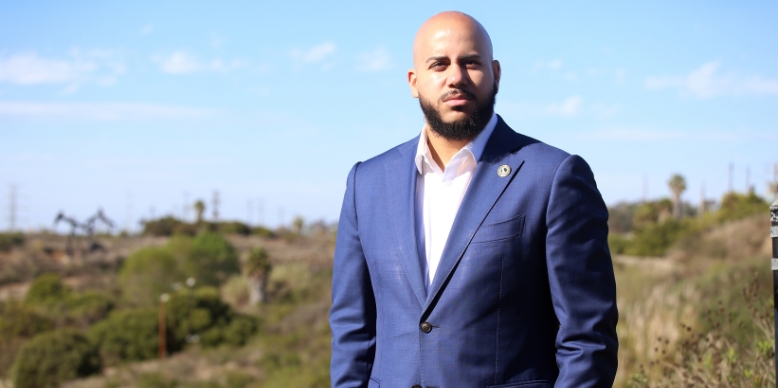Isaac Bryan drew a rough hand early on.
Given up at birth by a teenage mother who couldn’t care for him, he was raised in foster care. He flunked out of middle school. To get through college, he worked as many as three jobs simultaneously.
Those circumstances gave him a specific understanding of the needs and potential of children and young people in the dependency system. Today, the 33-year-old UCLA graduate is serving his third term in the California Assembly. He has already shepherded significant reforms into state law to improve care and financial support for kids in that system. This year, he’s pushing new legislation to further protect children and better prepare them for adulthood.
Bryan’s interests range beyond foster care. As chair of the Assembly’s Committee on Natural Resources, he muscled oil companies into a deal last year that will ultimately force them to close low-performing wells in the Inglewood Oil Field. Following January’s catastrophic wildfires, he and his colleagues are working to protect Californians against future climate-fueled infernos. And he is helping to lead the work to resist Trump Administration efforts to roll back environmental and civil rights protections.
“I wouldn’t be surprised if he’s a major force in California politics,” said UCLA Professor Mark Peterson, one of Bryan’s mentors at the Luskin School of Public Affairs. “And maybe beyond.”
Determined to make changes
Bryan arrived in Sacramento in 2021 determined to improve the odds for foster kids.
His foster parents, with whom he remains close, have cared for some 200 children over the years, adopting nine of them, including Bryan.
The family moved often during his early years — from Texas, where Bryan was born, to Florida, back to Texas, then Utah — adding children along the way. They landed in California when Bryan was 12.
His time in foster care bonded him to his siblings and foster parents, and it taught him. He saw, for instance, “how being touched by the child welfare system in any capability meant you would struggle in school.”
Struggle he did. Bryan attended seven schools, including three high schools. “Middle school was the only school I did start to finish. I needed a 1.0 average, but I couldn’t keep it.” He was allowed to move ahead anyway.
Other family members have had their hard times as well. One brother was part of the juvenile justice system, another is in state prison, and still another is currently unhoused. Bryan pinpoints the structure of foster care as a big part of the problem.
“Children are not born bad. Parents are not born bad,” he said. “I saw how system failures stack on top of one another in a fairly predictable way, and I could imagine a better way.”
Since arriving in Sacramento, Bryan has focused on addressing those failures, and eight bills that he has introduced in this area have become law. One measure stops the practice of county foster care agencies using federal survivor benefits intended for children whose parents have died for agency operating costs. Now those benefits must be reserved for the child when he or she ages out of dependency care. Another mandates that court-ordered family services such as parenting classes be evidence-based and work toward reunification. Other laws ensure that counties cannot block reunification simply because parents are too poor to pay court fees or meet other financial obligations.
Nature, nurture and policy
At the University of Arizona, Bryan began to understand how public policy could change lives. His undergraduate mentor was Michael Polakowski, a former law enforcement officer turned political science professor. Bent on law school, Bryan took Polakowski’s classes on criminal justice policy — and began hanging around his office.
Sensing Bryan’s interest in the topic, the professor gave him two stacks of extra readings on racism and justice. The first stack focused on the existence of a so-called “superpredator” and “the criminal gene.”
Bryan read everything and, furious, returned to Polakowski’s office.
“My biological father raped my mother,” he told the professor. “Does this mean that I have a biological predisposition to commit crime?”
The second pile of readings explored the social determinants of crime — the nature-vs-nurture argument. Those resonated with Bryan’s own experience and that of his family members.
Polakowski “helped me realize that what I cared most about were condi- tions in the community and the policies that shaped them,” Bryan said. “He opened my eyes that you don’t have to be a lawyer to shape public policy.”
For his part, Polakowski recalled that of the thousands of undergraduates he’d taught over 32 years, “I can honestly say that Isaac Bryan was in the top five in terms of his motivation and what he wanted to achieve.”
Once graduated from the University of Arizona, Bryan pursued a master’s degree at Luskin and secured a research position with UCLA’s Ralph J. Bunche Center for African American Studies. At Luskin, he worked with Professor Laura Abrams, as well as with then-Sen. Holly Mitchell, on legislation mandating that children under 12 years old could no longer be arrested or prosecuted, with a few exceptions. Gov. Jerry Brown signed the measure in 2018.
“I passed my first law as a student,” Bryan said.
Mitchell, now a member of the Los Angeles County Board of Supervisors, has remained a friend and confidant.
At the Bunche Center, Bryan explored the impact of high incarceration rates among African American men on their neighborhoods.
When fellow Democrat Sydney Kamlager-Dove, then an Assemblymember, was elected to the state Senate, Bryan won her seat in a special election on a platform that included criminal justice reform. He was 29.
Today, Bryan sports a Lincolnesque beard with a slow smile and attire that leans casual — sport coat over T-shirt.
“To meet Isaac is to be charmed,” said UCLA’s Peterson. “No one comes away from meeting with him feeling belittled. In this Trumpian era, he’s kind of the opposite in terms of the way he behaves and interacts.”
He, his wife, and their two Great Danes rent in the Crenshaw corridor, toward the eastern end of an Assembly district that includes Culver City, Ladera Heights, View Park-Windsor Hills, Beverlywood and Mar Vista. Bryan has moved four times since he was elected, each time heading farther south and east to find affordable housing, he noted.
Setbacks, perseverance
Despite his successes, Bryan has had “some significant disappointments,” noted Mitchell. In August, a long-running effort he supported to provide reparations to African American descendants of people enslaved in the United States failed to clear the State Senate.
Also last year, Bryan was briefly the Assembly majority leader before Speaker Robert Rivas reassigned him as chair of the Natural Resources Committee, a move widely regarded as a demotion.
Bryan paints the shuffle as a lemons-to-lemonade opportunity. “We turned it into a powerhouse committee,” he said.
In his first year as chair, he helped forge a deal to shut down the Inglewood Oil Field by 2030. Oil was first discovered at the Baldwin Hills site in 1924 and at its peak, included over 1,600 wells. Spanning approximately 1,000 acres, it remains one of the largest contiguous urban oil fields in the United States.
Prior to the 2030 closing, the deal also requires that the lease funds the company pays to extract the remaining oil go toward affordable housing and urban greening in adjacent communities that have borne the brunt of pollution from the wells.
Gov. Gavin Newsom signed the bill in September during a ceremony at the oil field. Holding up his cellphone, the governor displayed a photo Bryan texted him from Venice, Italy, where he and his wife were on their honeymoon, as an apology for missing the event.
The January wildfires and their aftermath have presented an urgent new challenge. Along with Sen. Ben Allen, Bryan is part of an informal legislative working group that is considering a series of fire prevention measures, possibly including tougher vegetation management rules, controlled burns and additional “home hardening” requirements in vulnerable areas.
President Trump’s threats to undermine California’s historic environmental protections, along with last year’s U.S. Supreme Court decision limiting the scope of the federal Clean Water Act, have pushed the Legislature to beef up statewide clean water protections. Additionally, the state has required local jurisdictions to develop their own plans to respond to extreme-heat events, a step necessary should California need to request FEMA’s help.
The $10-billion bond that California voters authorized last November will help fund these initiatives and other environmental and climate projects, as well as drinking water improvements.
Because many state lawmakers see the Trump administration as a threat beyond environmental issues, shortly after new members were sworn in on December 2, the Legislature preemptively allocated $50 million to the California Department of Justice for ongoing and future legal challenges, a precaution that Bryan enthusiastically supported. A coalition of 19 states has already sued to override Trump’s plans to eliminate birthright citizenship and to protect the personal data of Californians.
“We won 70% of the cases in the last Trump Administration,” Bryan notes, but “we’re in for a long four years.”
Improving dependency care remains his priority. Among the bills Bryan introduced early this year are measures to increase funding for children with developmental disabilities and those cared for by relatives. Another would allow parents who are incarcerated to be physically present at proceedings to terminate the parental rights of their child,
With all this attention, are the long-troubled county agencies responsible for these children — including the Los Angeles Department of Children and Family Services — improving?
Bryan sighs. “Folks are actively working to make improvements, to increase reunification,” he said. “But the need is that great.
“We’ll always be paddling upstream unless we improve the conditions families are in. We need to look at this through the lens of improving affordable housing, because families that have their basic needs met tend to be able to provide for their children.”
Supervisor Mitchell has urged Bryan to see his time in the Assembly as a “sprint” because with California’s 12-year term limit to serve in the Legislature, she said, “your first day on the job, you know your expiration date.”
Bryan still has almost eight years.

























